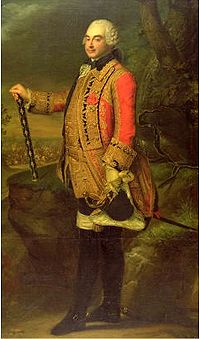
Battle of Lutterberg (1758)
Encyclopedia

Charles, Prince of Soubise
Charles de Rohan , duke of Rohan-Rohan, seigneur of Roberval, and marshal of France from 1758, was a military man, a minister to the kings Louis XV and Louis XVI, and a notorious libertine. The last male of his branch of the House of Rohan, he was also the great grandfather to the duc d'Enghien,...
and a much smaller Anglo-German force commanded by General Christoph Ludwig von Oberg.
The two armies clashed near the town of Lutterberg, Lower Saxony
Lower Saxony
Lower Saxony is a German state situated in north-western Germany and is second in area and fourth in population among the sixteen states of Germany...
. The 14,000 mostly Prussian Allied troops, were overwhelmed by several charges of French cavalry and were forced to withdraw. Despite having won a decisive victory, Soubise was slow to pursue the retreating enemy - causing his superiors in Paris to replace him with the Marquis de Contades.
Soubise earned a Marshal
Marshal of France
The Marshal of France is a military distinction in contemporary France, not a military rank. It is granted to generals for exceptional achievements...
’s baton for this victory. François de Chevert
François de Chevert
François de Chevert was a French general.Chevert entered service in 1706, became major in Beauce's regiment in Toul in 1728, later in 1739 lieutenant-colonel. He distinguished himself in Flanders, Piemont and Germany and herefore rewarded by a more important command...
was decorated with the Grand Croix
Légion d'honneur
The Legion of Honour, or in full the National Order of the Legion of Honour is a French order established by Napoleon Bonaparte, First Consul of the Consulat which succeeded to the First Republic, on 19 May 1802...
for his contributions in the battle.

